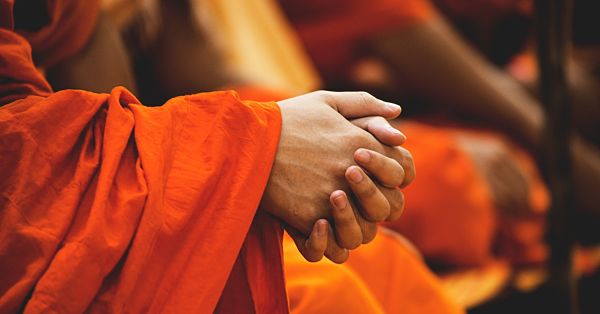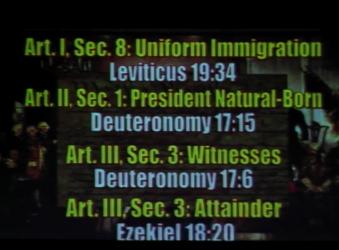 I have come to believe that some historical myths will never die.
I have come to believe that some historical myths will never die.
In this Liberty Counsel edition, Mat Staver and Matt Barber reinforce their mutual misunderstanding of this story, making the delegates to the Constitutional Convention prayer warriors. As I have documented previously, Franklin proposed daily prayers but the Convention delegates did not vote favorably on his motion. In fact, daily prayers were not thought necessary by most of the delegates.
Staver and Barber began by celebrating a recent federal appeals court decision allowing a Texas school board to open in student-led prayer. Then at 3:43, a female speaker said:
You know America was founded on prayer and prayer has been a common practice since the very beginning and I guess yo know Mat it reinforces what we do at Liberty Counsel to stand for these rights and stand for that privilege of prayer.
Mat Staver: Prayer, like I said, predated the First Amendment. How did it begin in our country as it results in these kind of meetings? It began with Benjamin Franklin during the early Constitutional Conventions. During those Constitutional Conventions where they were debating after the revolution what to do, what kind of form of government are we going to have. We had one view, we had another view, different states had, you know, the Virginia proposal, or this proposal or that proposal and they had as many opinions yes as they did no, so it started to fall apart. At that point in time, Franklin stood up and he has this famous speech where he talks about, ‘unless God builds the house, we’re not going to be any better off than the builders at Babel and that God governs in the affairs of men and have we now forgotten our most powerful friend or do we think we no longer need him. And he implored everyone from that point on to every time they deliberate, to begin their deliberations with prayer. They did. They had a long prayer, not just a short little 60 second, two minute prayer, but a long prayer meeting that was a turning point that ultimately brought America’s founding together and ultimately the United States Constitution and later the Bill of Rights which is the First Amendment and that’s why the Supreme Court said prayer’s been with us since the very beginning, the foundation of who we are. It cannot be unconstitutional, it was people who started prayer who later drafted the First Amendment and then continued to pray.
Matt Barber then quoted Franklin’s speech at the Convention. He then asked Staver, “How long did they pray Mat?” Staver said, “It took up several hours. It wasn’t just a little prayer, bless this meal and walk away.” Barber then said what happened doesn’t fit the narrative of the left.
What Really Happened?
In fact, what happened doesn’t fit Mat Staver’s narrative. Franklin did in fact make a motion asking for prayers before meetings, but his motion was never voted on. The Convention adjourned without any prayers. Only a few delegates wanted to vote in favor of Franklin’s motion. To address the facts, I am going to reproduce a portion of a prior post on this subject. In essence, Staver and Barber are calling James Madison a liar.
Madison recorded what happened next.
Mr. SHERMAN seconded the motion.
Mr. HAMILTON & several others expressed their apprehensions that however proper such a resolution might have been at the beginning of the convention, it might at this late day, 1.64 bring on it some disagreeable animadversions. & 2.65 lead the public to believe that the embarrassments and dissensions within the Convention, had suggested this measure. It was answered by Docr F. Mr. SHERMAN & others, that the past omission of a duty could not justify a further omission-that the rejection of such a proposition would expose the Convention to more unpleasant animadversions than the adoption of it: and that the alarm out of doors that might be excited for the state of things within, would at least be as likely to do good as ill.
Mr. WILLIAMSON, observed that the true cause of the omission could not be mistaken. The Convention had no funds.
Mr. RANDOLPH proposed in order to give a favorable aspect to ye measure, that a sermon be preached at the request of the convention on 66 4th of July, the anniversary of Independence; & thenceforward prayers be used 67 in yr Convention every morning. Dr. FRANKn. 2nd this motion. After several unsuccessful attempts for silently postponing the 68matter by adjourn; the adjournment was at length carried, without any vote on the motion.
[Note 15: 15 In the Franklin MS. the following note is added:–“The Convention, except three or four persons, thought Prayers unnecessary.”] (emphasis added)
In short order, two motions hit the floor. Franklin moved for daily prayers with a second by Roger Sherman. Then Edmund Randolph suggested a sermon followed by prayers. Franklin seconded that motion. Neither motion was voted on and the Convention adjourned. In fact, Franklin later noted that “The Convention, except three or four persons, thought Prayers unnecessary.” While I am sure at least some of the founders took God seriously, this story isn’t a good one to offer as evidence.
Staver and Barber also push the idea that the prayers turned the Convention toward compromise.
Well, first there were no prayer meetings so that is a problem for that narrative.
Second, the Convention didn’t come back after the July 4th recess all prayed up and ready to compromise. On July 10, George Washington wrote Alexander Hamilton (who left the convention after the recess) and said:
I thank you for your Communication of the 3d. When I refer you to the State of the Councils which prevailed at the period you left this City—and add, that they are now, if possible, in a worse train than ever; you will find but little ground on which the hope of a good establishment, can be formed. In a word, I almost dispair of seeing a favourable issue to the proceedings of the Convention, and do therefore repent having had any agency in the business.
The disputations continued even after Franklin’s motion. It was not until mid-July, with the threat of dissolution hanging over their heads, that the delegates reached a compromise. Even then, four delegates left the convention in protest (John Mercer, Caleb Strong, John Lansing, Luther Marton) and three delegates didn’t sign the Constitution because it lacked a bill of rights (George Mason, Edmund Randolph, Elbridge Gerry). In the end, only 39 of the 55 delegates signed the document. The more parsimonious explanation for the consensus is that those with strong disagreement left the Convention.
Prayers before government meetings is a tradition and may continue to survive court challenges. However, the Franklin prayer myth isn’t necessary to defend such prayers. Staver and Barber should correct the record with their listeners so that error isn’t multiplied.
See also this post on Franklin’s prayer proposal.

